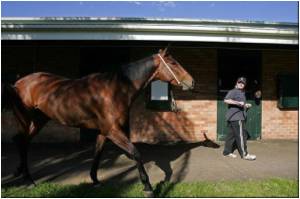The ancestor of all living horses, donkeys and zebras lived about four million years ago, pushing back the confirmed age of their progenitor by two million years finds a new study.

Among other insights, the sequence supports the often-debated view that the Przewalski's horse, native to the Mongolian steppes, is the last living population of truly wild horses in the world.
And while the new study offers an intriguing look into the history of horses and how they have changed over millenia, the research also opens up the possibility of getting a much longer view into the evolution of all sorts of species, including people.
In 2003, Eske Willerslev, an evolutionary geneticist at the University of Copenhagen and colleagues retrieved a horse fossil from a site in Canada's Yukon Territory, which contains some of the oldest permafrost on Earth. Based on volcanic ash preserved in the soil, the researchers estimated that the fossil was at least 700,000 years old.
When they scanned the bone for biomolecules, they were surprised to find both collagen and proteins, giving them hope that the bone might also still contain DNA, even though the oldest surviving DNA ever recovered from a fossil to date was only about 130,000 years old.
The team started with classic techniques to amplify DNA and build a genetic library, Willerslev said, but they ran into too much contamination. Most of the DNA they extracted belonged to microbes.
Now that they had such an old specimen to contrast with modern versions, the researchers were able to calibrate the mutation rate and then work back to an age of origin for the ancestral horse.
There has been plenty of debate about when exactly Equus began, and while some paleontologists have suspected a history spanning 4 million years, the oldest known true horse fossil is only 2 million years old. The new findings strengthen the idea of an older history.
The study is published in the journal Science.
Source-ANI
 MEDINDIA
MEDINDIA



 Email
Email




